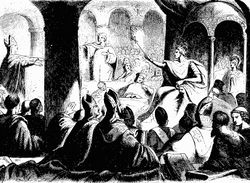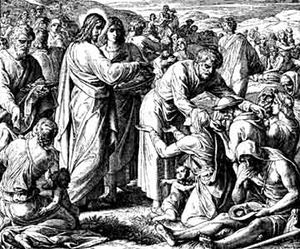Template:Nicene: Difference between revisions
No edit summary |
No edit summary |
||
| Line 1: | Line 1: | ||
== Nicene Council == | == Nicene Council == | ||
<blockquote>'' “Beware of false prophets, which come to you in sheep’s clothing, but inwardly they are ravening wolves. Ye shall know them by their fruits. Do men gather grapes of thorns, or figs of thistles?” (Matthew 7:15-16)''</blockquote> | <blockquote>'' “Beware of false [[prophets]], which come to you in sheep’s clothing, but inwardly they are ravening wolves. Ye shall know them by their fruits. Do men gather grapes of thorns, or figs of thistles?” (Matthew 7:15-16)''</blockquote> | ||
Constantine was no shepherd of Christ much less a "bishop of bishops" of Christ's church. The more we study the detailed thorns of Constantine’s life and those ministers he and his successors appointed over men, the less convincing it is that the fruits of the Holy Spirit were in their questionable conversions. There were thousands upon thousands that suffered and toiled under their ''“exercising authority”'', with tens of thousands who died at their murderous, bloody hands. The testimony of their lives bears witness to the purity or impurity of their souls and their claim to faith in Christ. | [[Constantine]] was no shepherd of Christ much less a "bishop of bishops" of Christ's church. The more we study the detailed thorns of Constantine’s life and those ministers he and his successors appointed over men, the less convincing it is that the fruits of the Holy Spirit were in their questionable conversions. There were thousands upon thousands that suffered and toiled under their ''“exercising authority”'', with tens of thousands who died at their murderous, bloody hands. The testimony of their lives bears witness to the purity or impurity of their souls and their claim to faith in Christ. | ||
<blockquote>'' “Constantine intervened in ecclesiastical affairs to achieve unity; he presided over the first ecumenical council of the church at Nicaea in 325.”<Ref>Microsoft Encarta 97 </Ref>''</blockquote> | <blockquote>'' “Constantine intervened in ecclesiastical affairs to achieve unity; he presided over the first ecumenical council of the church at Nicaea in 325.”<Ref>Microsoft Encarta 97 </Ref>''</blockquote> | ||
Revision as of 09:05, 18 June 2021
Nicene Council
“Beware of false prophets, which come to you in sheep’s clothing, but inwardly they are ravening wolves. Ye shall know them by their fruits. Do men gather grapes of thorns, or figs of thistles?” (Matthew 7:15-16)
Constantine was no shepherd of Christ much less a "bishop of bishops" of Christ's church. The more we study the detailed thorns of Constantine’s life and those ministers he and his successors appointed over men, the less convincing it is that the fruits of the Holy Spirit were in their questionable conversions. There were thousands upon thousands that suffered and toiled under their “exercising authority”, with tens of thousands who died at their murderous, bloody hands. The testimony of their lives bears witness to the purity or impurity of their souls and their claim to faith in Christ.
“Constantine intervened in ecclesiastical affairs to achieve unity; he presided over the first ecumenical council of the church at Nicaea in 325.”[1]
He claimed the office of Pontifex Maximus or High Priest, till he died. As the ruling High Priest, he had demanded that the bishops of the Church come to his council. There were over 1800 known bishops at that time and barely 300 came. He sat on a golden throne, claiming to be the “Bishop of Bishops”, not a servant of servants, but as a dictator.

The First Council of Nicaea instituted by Constantine promoted a false ideology that religion is "what you think about God". This lie fueled by debate began redefining the word "religion" and has brought persecutions, inquisitions, and wars ever since.
From Nicene Creed with the birthing pains of new doctrines which would not only unmoor the Gospel of the kingdom from its meaning but cover the truth in a cloud of doctrinal beliefs.
The historical record shows that those who answered the call of Constantine were financially rewarded with the spoils of Constantine's imperial rule. Extravagant gifts of gold, silver, buildings, property, and privilege were bestowed on these collaborating bishops who accepted his rule from the top down. Those bishops who sanctioned his benevolence and title of “bishop of bishops” are difficult to justify.
Did they abandon the teachings of Christ for the rewards of unrighteousness?
His gifts had been taken from fields of corpses and from an overtaxed populations. If ever there was a sin of the Nicolaitan branded on the head of men, it was here at this council of hypocrisy. How could men justify this fundamental departure from the teachings of Christ by becoming the state Church of Constantine?
Fortunately, these men were a small minority.
True Christian faith continued to thrive in those who remained in the liberty of Christ. Those who did not answer his call or questioned his assumed authority were sent packing or, in the years to follow, were labeled heretics and cast out of the graces of these despotic '‘bishops'’, or simply murdered as heretics.
In 381 A.D., the Council of Constantinople was convened by Theodosius I. Only 150 bishops attended condemning various religious groups that did not heed the call of the emperor. Theodosius was as much a tyrant, and more, a murder of thousands.

Several emperors had earlier guaranteed the protection of the Church. The idea that the Church was “legalized” may not be far from the truth, but what exactly does that mean? There was now an official Church of Rome established by men who found favor with the rulers of Rome, but were they true Christians? Or were they taking the name of the Lord in vain?
The legalizing of the Christian church was more a legalizing of certain collaborative sects of churches who claimed to be Christians and were willing to turn a blind eye, or at least give a grateful wink, to the autocratic oppression by these manipulating chiefs of state in exchange for exemption, if not wealth and protection.
Christ would not appeal to Rome to save his life, but these men petitioned Constantine and his senate, not to save their own life, but to take the lives of others. Abraham would not take a buckle, but these men took lavish gifts of gold and silver. They seemed to be “the lovers of soft things” like the Essenes spoken of in the courts of Herod.
These sects and governments have been able to control the writing of history throughout the ages. But, probably even more importantly, they promoted the compilation of the books we know today as the Bible. There is no clear record of how some writings were excluded and how others were chosen to be placed into what some referred as the canon.
“The 27 books of the New Testament are only a fraction of the literary production of the Christian communities in the first three centuries.”[2]